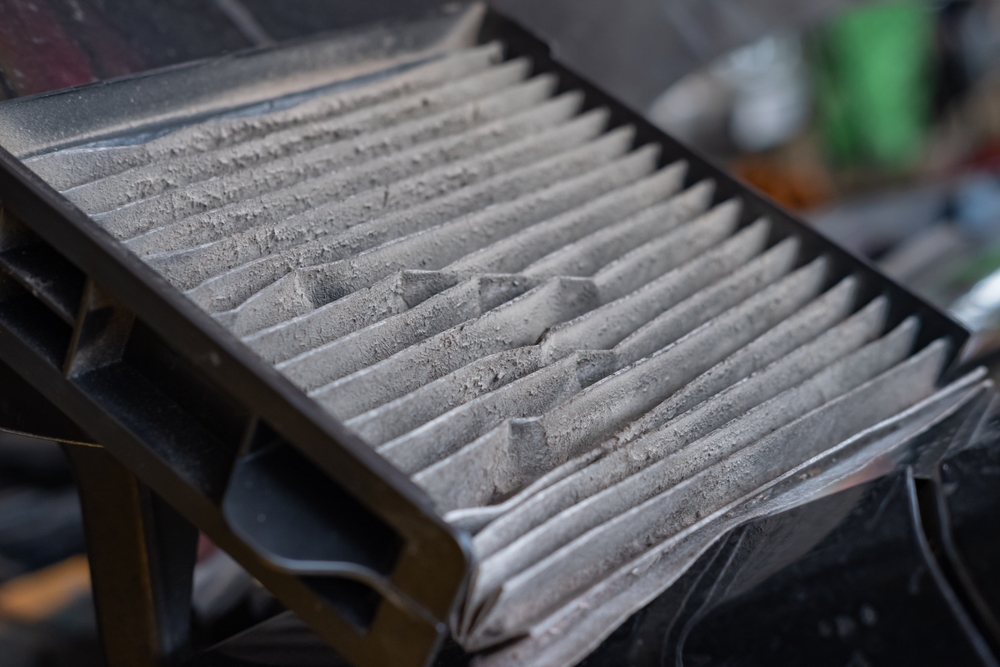
Picture this: you slide into your car on a hot day, turn on the air conditioning, and are immediately greeted by a pungent odor that reminds you of a high school locker room. This unpleasant phenomenon, often attributed to “Dirty Sock Syndrome,” is surprisingly common in car AC systems. But what exactly causes this smell, and more importantly, how can you get rid of it?
Understanding the Source of the Foul Odor
The smell reminiscent of dirty gym socks coming from your car’s AC is usually due to mold, mildew, and bacteria growing on the evaporator coil within the air conditioning system. The evaporator coil cools the air before it’s blown into your car’s cabin. However, during this process, condensation forms on the coil, creating a damp environment that’s perfect for mold and bacteria to thrive.
Over time, dust, dirt, and organic material can also accumulate on the evaporator coil, further fueling the growth of these microorganisms. When you turn on your AC, air passes over the contaminated coil and carries the foul odor into your car, making every drive an unpleasant experience.
Common Causes of the Offensive Smell
- Moisture Accumulation: The evaporator coil inside your car’s AC system is particularly prone to moisture build-up, especially if the AC system isn’t used frequently. This moisture, combined with the warm, dark environment of the AC unit, creates the perfect breeding ground for mold and bacteria.
- Clogged or Dirty Air Filters: Air filters are designed to trap dust, pollen, and other particles before they enter your car’s AC system. If these filters aren’t changed regularly, they can become clogged, allowing particles to bypass the filter and accumulate on the evaporator coil, contributing to the unpleasant smell.
- Neglected Maintenance: Lack of regular maintenance, such as not cleaning the evaporator coil or replacing the air filter, can lead to the build-up of mold and bacteria in your AC system. Regular maintenance is key to preventing these odors from taking over your car’s interior.
The Health Risks of Ignoring the Smell
While the smell is unpleasant, the underlying cause—mold and bacteria—can pose health risks, especially for those with allergies or respiratory conditions. Mold spores can be dispersed through your car’s ventilation system, leading to symptoms such as coughing, sneezing, headaches, and in severe cases, asthma attacks. In rare instances, certain types of mold can produce toxins that are harmful to your health, making it crucial to address this issue promptly.

How to Get Rid of the Stench
- Clean or Replace the Air Filter: Start by checking your car’s air filter. If it’s clogged or dirty, replace it with a new one. A clean air filter can significantly reduce the amount of dust and debris entering your AC system.
- Professional Cleaning of the Evaporator Coil: Since the evaporator coil is the primary source of the smell, having it professionally cleaned is one of the most effective ways to eliminate the odor. A professional can use specialized cleaners to remove mold and bacteria from the coil without damaging the AC system.
- Install an Antimicrobial Treatment: After cleaning, some service providers offer the option to coat the evaporator coil with an antimicrobial agent. This treatment helps prevent the re-growth of mold and bacteria, keeping your car smelling fresh for longer.
- Use UV Light Technology: Some automotive service centers may suggest installing a UV light system within the AC unit. UV light helps kill bacteria and mold on the evaporator coil, providing a more permanent solution to odors.
- Regular Maintenance: Prevention is better than cure. Regularly servicing your car’s AC system, including cleaning the evaporator coil and replacing air filters, will help prevent the recurrence of the foul odor. Make it a point to include AC system maintenance in your car’s annual service routine.
The Role of Cabin Air Quality
The air quality inside your vehicle is directly affected by the condition of your AC system. A dirty or malfunctioning AC not only causes unpleasant odors but can also degrade the air you breathe. Pollutants, allergens, and bacteria can circulate through the car’s interior if the AC system is compromised, leading to health issues such as respiratory problems and allergies. Regularly servicing your AC, including replacing air filters and cleaning the evaporator coil, can significantly improve the air quality inside your vehicle, ensuring a healthier driving environment.
Climate and Environmental Factors
The likelihood of experiencing mold and bacterial growth in your car’s AC system can be influenced by the climate in which you live. Humid and warm environments are particularly conducive to the development of these microorganisms. If you live in a region with high humidity, it’s important to take extra precautions, such as running the AC more frequently, ensuring proper airflow, and parking in shaded areas to reduce the system’s exposure to moisture. In contrast, colder climates may see less frequent use of the AC, leading to a different set of maintenance needs to prevent stale air and musty smells.
Impact on Your Vehicle’s Resale Value
Ignoring issues like a smelly AC system can have long-term consequences beyond just discomfort. A foul-smelling AC can be a red flag for potential buyers if you plan to sell your car in the future. It suggests poor maintenance and could lead buyers to believe there might be other hidden issues. Ensuring that your AC system is clean and functioning properly not only improves your driving experience but also helps maintain or even increase your vehicle’s resale value. Prospective buyers are more likely to purchase a car that smells fresh and has a well-maintained air conditioning system.
These additional sections provide further insights into the importance of maintaining your car’s AC system, touching on aspects of health, climate considerations, and the potential financial impact on your vehicle’s value.

A Comprehensive Approach for AC Repairs
Understanding the Evaporator Coil’s Role
The evaporator coil plays a crucial role in your car’s AC system, acting as the cooling element that lowers the air temperature before it’s blown into the cabin. Because of its cooling function, the coil is particularly susceptible to moisture build-up, which can lead to mold growth if not regularly cleaned.
The Importance of Airflow in Preventing Odors
Proper airflow is essential in preventing moisture and debris from settling in your AC system. Ensuring that the air filter is clean and that air can flow freely through the system will help reduce the risk of bacteria and mold growth.
Signs Your AC Needs Immediate Attention
Aside from the unpleasant smell, other signs that your AC system may need attention include reduced airflow, strange noises when the AC is turned on, or a noticeable decrease in cooling efficiency. These could indicate more serious issues within the system that require professional inspection.
DIY vs. Professional Solutions
While some car owners may attempt to address the odor with DIY solutions such as disinfectant sprays, these methods often provide only temporary relief. For a long-term solution, it’s advisable to seek professional services that can thoroughly clean and treat the AC system, ensuring the problem doesn’t recur.
Preventive Measures to Keep Your AC Fresh
To keep your car’s AC system fresh and odor-free, consider adopting preventive measures such as running the blower without AC for a few minutes before turning off your car, which helps to dry out the evaporator coil. Additionally, park in shaded areas to reduce the overall moisture accumulation in your vehicle.
Keep Your Car’s AC System in Top Condition
The smell in your car’s AC is more than just an inconvenience—it’s a sign that your AC system needs attention. By addressing the problem promptly and maintaining regular care, you can ensure your car remains a pleasant environment.
If you’re dealing with a stinky car AC and need a reliable solution, consider contacting Autoscope. Their experienced technicians specialize in AC maintenance and can help eliminate odors, ensuring your car’s air conditioning system remains clean and effective. Don’t let Dirty Sock Syndrome ruin your ride—take action today!


